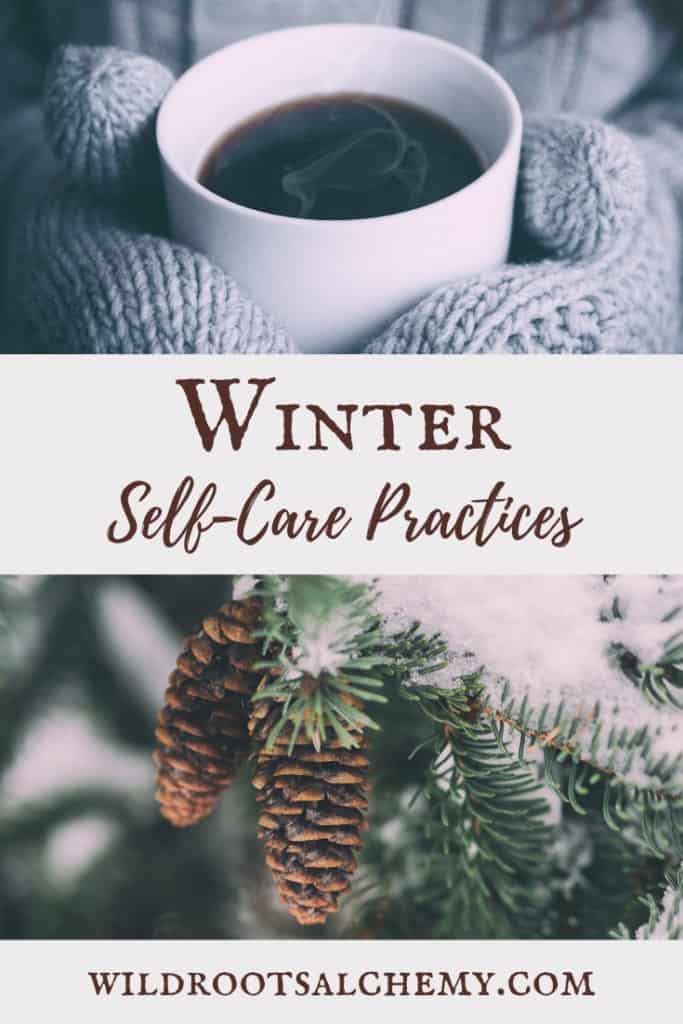
Brrrr, it’s cold outside!
December 21st marked the first day of winter in the northern hemisphere. Here in the Colorado foothills, snow is abundantly falling and so it’s the perfect day to cozy up and write an article about how to stay healthy and care for yourself during the winter season!
As we intuitively understand, Nature is infinitely wise and everything in the natural world is infused with meaning, including our four seasons. There is a reason that after the fiery, energetic summer season that we slow down into autumn—a season where we reap what we planted in the spring—and slowly start to retreat into the quiet rest of winter to preserve our energy and prepare for another energetic cycle.
With shorter, darker, and colder days, Nature tells us that this season is a time of slowing down, of retreating into our internal awareness and mirroring the peaceful stillness and dormancy that is seen all around in many of Earth’s life forms. This stillness encourages us to rest, relax, and reflect on the year behind us and the year ahead.
So what are the energetic qualities of winter? While it depends on your location, many of us experience a winter that is cold and dry with varying degrees of dampness in the form of rain and snow. To balance the energetics of winter, we must adapt our lifestyle to align with the season, promoting warmth and a balance of moisture, all of which is influenced by our own individual inner terrains.
All life forms—animals, plants, and even human beings—flow with the cycles of nature and we are at our healthiest when we are in tune with nature’s rhythms. The following self-care practices will help you align with the season and can prevent physical or mental/emotional imbalances from arising.

Winter Self-Care Practice #1: STAY WARM
With temperatures dipping low, it’s important to keep your body warm from the inside out and the outside in! Wear layers of clothing, ensuring that your feet, head, and neck remain covered and toasty. Keep thick socks and slippers on when walking around the house, as warm feet promote healthy circulation to the rest of the body, including your vital organs. Wear a scarf around your neck and a beanie or wool hat to keep warmth from escaping from your head. At the end of the day, take a hot bath to treat your whole body.
Cozy up with hot teas and beverages to warm you from the inside out–even better if you’re snuggling up with a blanket and a loved one! (See ideas for herbal tea recipes below.)
Winter Self-Care Practice #2: STAY ACTIVE
Cold, gray days can make it hard to get outside and move our bodies, but movement remains essential to our health even in the midst of winter! Physical activity promotes circulation and a healthy immune system, important for fending off those winter colds. If playing around in the snow isn’t your jam (bundled up from head to toe, of course!), enjoy some yoga, tai chi, or stretching in the mornings and evenings to keep your body limber and vital.

Winter Self-Care Practice #3: EAT NOURISHING FOODS
Naturopathic doctors are often heard quoting Michael Pollan’s famous piece of dietary advice: “Eat real food, not too much, mostly plants.” This holds true even in winter, although with the colder temperatures, our digestive fire is working overtime to keep us warm and sometimes needs more fuel than it does during the hotter months. Thus heavier, more starchy foods are typically easier digested in wintertime.
Start each morning with a mug of hot lemon water—this is an Ayurvedic trick for promoting healthy digestion and regular bowel movements. It gently detoxifies your body by promoting healthy liver function and flushes out your digestive tract, stimulating your digestive juices and bile production. The added vitamin C from the lemon is also an extra boost to your immune system.
Throughout the day, eat warm, cooked meals, focusing on hearty and nutrient-dense foods: squash, root vegetables (like sweet potatoes, beets, carrots, and burdock root), mushrooms, broths, soups, stews, and curries. Check out this winter roasted roots recipe from My New Roots for a tasty way to eat your veggies this season!
During the winter, feel free to spice up your food as much as you’d like. Spices like ginger, garlic, cumin, and pepper all stimulate digestion and promote warmth. On the flip side, avoid cold foods—your body has a difficult time warming them up this time of year! Dairy and sweets are also best avoided during the winter time as they promote excess dampness in the body, potentially contributing to a feeling of heaviness, lethargy, melancholy, and brain fog.
Winter Self-Care Practice #5: SLEEP IN, IT’S GOOD FOR YOU!
The shorter winter days bring longer nights, inviting us to go to bed earlier and sleep in just a little later. It’s more important than ever to stick to a regular sleep/wake routine during the winter months, and your body will thank you for making sure you get all 8-9 hours of zzz’s.
Winter Self-Care Practice #6: TAKE CARE OF YOUR EMOTIONAL HEALTH
Our psychological processes are deeply entwined within the cycles of Nature. For this reason, it is important to follow Nature’s guidance and follow the energetics of the winter season in order to care for your mental/emotional health. Allow winter’s characteristics of stillness and rest to manifest themselves in your life. Take time to create a physical space where you can retreat, get comfortable, and become still—turning your attention inwards, allowing for reflection and contemplation.
This is a wonderful time to commit to a meditation practice and cultivate inner stillness and heightened inner awareness. It is also an ideal time to focus on gratitude; gratitude for the abundance in our lives, for what we have accomplished, for our loved ones, and for what our Earth has so generously provided. This gratitude will plant seeds of abundance that will bloom come springtime.
Here is a simple gratitude practice that you can start today:
- Write down 2-3 things that you are grateful for at the end of each day, just prior to going to bed. You’ll fall asleep with a smile on your face and a heart full of love.
- As soon as you start noticing a negative thought about a situation or a sense that you are somehow lacking something, determine what it is that you do want in life and express gratitude that it is coming your way.
Even though winter is intended to be an introspective season, the cold, gray days and the seasonal tendency towards solitude can cause some people to experience depression and loneliness. While making space for alone time is important, it must be balanced out with uplifting and meaningful social activity and time spent connecting with family and friends. If you do experience seasonal blues, herbal medicine can do wonders to support your mood (see #7 below for some examples).
Winter Self-Care Practice #7: BEFRIEND YOUR PLANT ALLIES

Plant medicine helps support our inner terrain so that it is in balance with the energetics of our natural environment. In the winter, plant allies that are warming help balance the coldness of winter. Some of these warming herbs can also help resolve excess dampness brought on by a damp winter or poor dietary choices, or even uplift a melancholic mood.
To keep warm this winter season, work with herbal medicine on a daily basis:
- Think chai spices: ginger, cinnamon, cardamom, cloves, black pepper. Chai tea is a wonderful way to work with the Fire element and warm up your whole body!
- Drink from a thermos of hot ginger tea throughout the day.
- Ayurvedic CCF tea (also called three seed tea): Add equal parts of cumin, coriander, and fennel to a jar and shake well. Add about 1 tablespoon of the mixture to a quart of water and boil for about 5 minutes. Strain out the herbs, pour the herbal infusion into a thermos, and drink throughout the day or before and after meals.
- See my post on Sagittarius herbal medicine for more info on warming and pungent herbs!
If your mood suffers during the winter, it may be helpful to work with these plant allies:
- Ceanothus americanus (Red root): Red root is a warming lymphagogue that is indicated for damp stagnation, especially when accompanied by sluggishness, melancholy, and apathy (mental/emotional stagnation). Drop doses of the tincture seem to work best for this plant’s psychospiritual applications.
- Hypericum perforatum (St. John’s Wort): The five-petaled, bright yellow flowers of St. John’s Wort embody the brightness of sunshine! In fact, medicinal applications of this herb bring light directly into your being and help ward off depression. Be careful if you are taking any medications though, as St. John’s Wort increases hepatic detoxification and can thus interact with many pharmaceuticals, including antidepressants and contraceptives.
- Rosmarinus officinalis (Rosemary): Rosemary improves circulation and can improve mental clarity and mood. Plus it smells divine!
What are your winter self-care practices? Feel free to comment below!
Photos in featured image courtesy of Aaron Burden and Alex on Unsplash.





